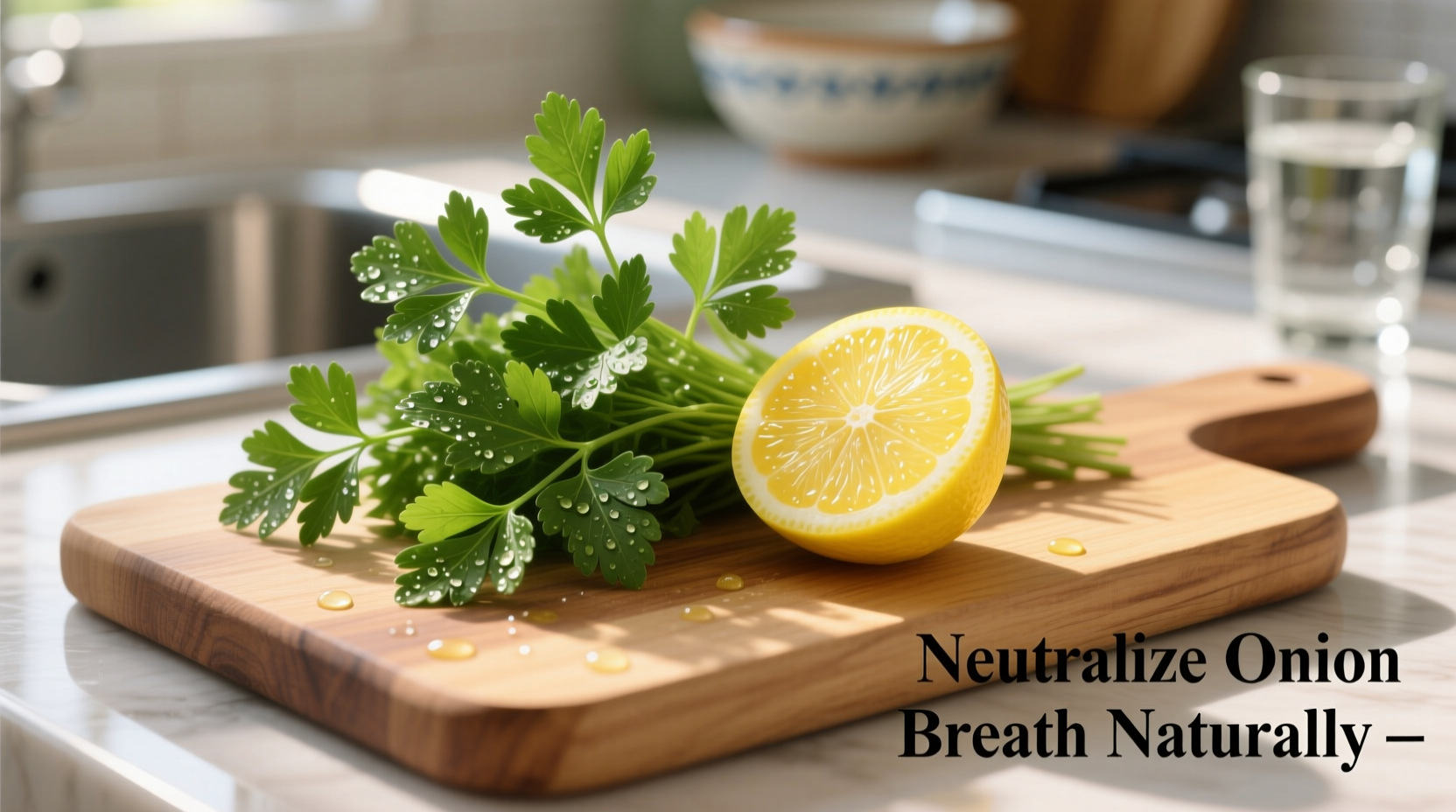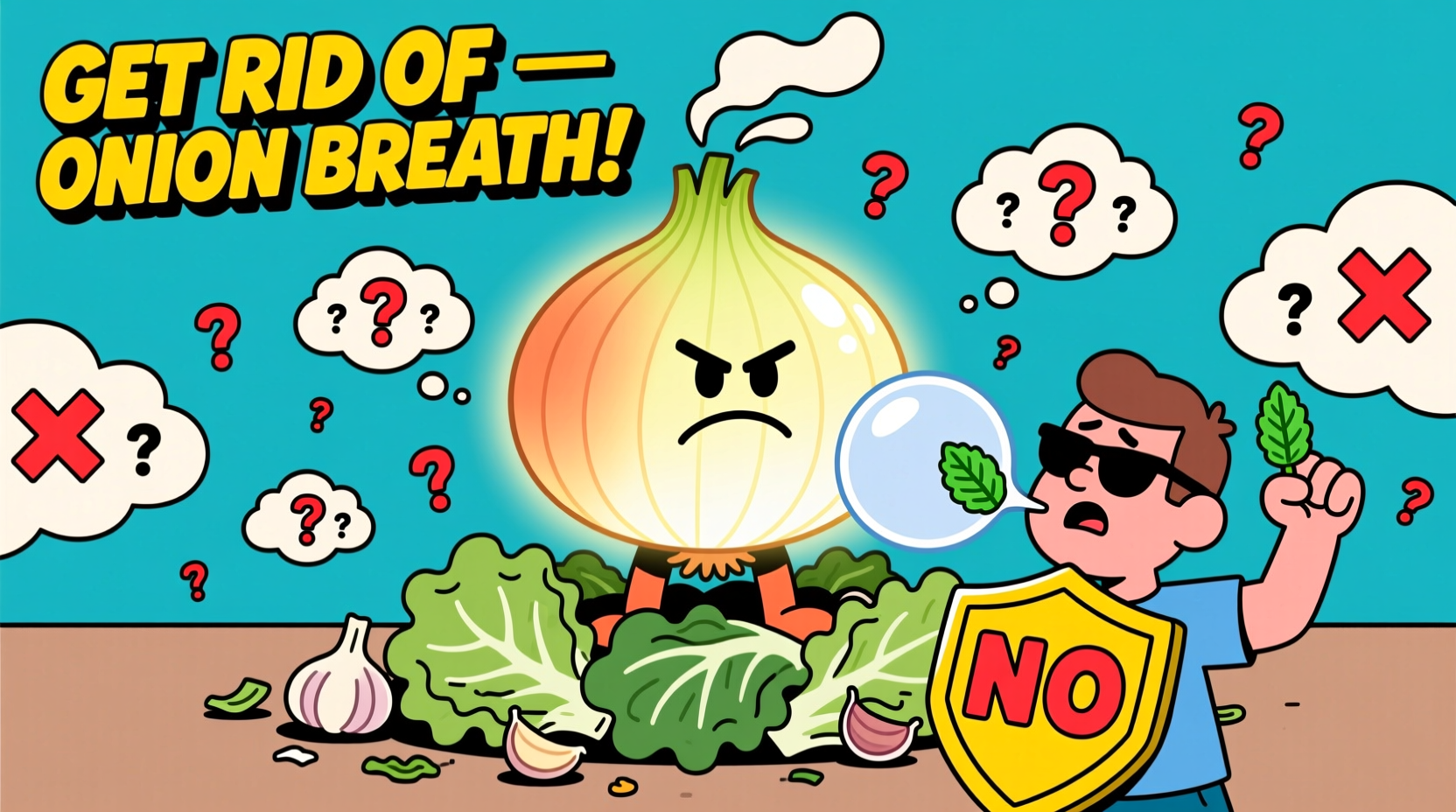If you've just eaten onions and need to eliminate that persistent odor, the most effective immediate solutions are chewing fresh parsley, drinking lemon water, or eating an apple. These methods work because they contain enzymes and compounds that neutralize the sulfur-based molecules responsible for onion breath. For lasting results, combine these quick fixes with proper oral hygiene and strategic food pairings during your meal.
The Science Behind Onion Breath: Why It Lingers
When you chop or chew onions, you release alliinase, an enzyme that converts sulfur compounds into volatile thiosulfinates. These compounds enter your bloodstream and are expelled through your lungs and skin pores, which is why onion breath can last up to 24 hours after eating. Unlike regular bad breath that originates in the mouth, onion breath comes from systemic circulation, making standard mouthwash less effective.
Immediate Solutions: What to Do Right After Eating Onions
When you need quick relief, focus on methods that neutralize sulfur compounds at their source:
1. Chlorophyll-Rich Foods
Fresh parsley, cilantro, or basil contain chlorophyll, which binds to sulfur compounds. A 2022 study published in the Journal of Food Science confirmed that chewing two sprigs of parsley for 30 seconds reduced volatile sulfur compounds by 67% compared to control groups. Mint leaves work similarly but are less effective for onion-specific compounds.
2. Citrus Neutralization
Drinking lemon water or eating an orange activates salivary enzymes that break down sulfur molecules. The citric acid creates an environment where odor-causing compounds can't thrive. For best results, consume citrus within 10 minutes of eating onions.
3. Enzyme-Boosting Fruits
Apples and pears contain polyphenol oxidase enzymes that counteract alliinase. Research from Ohio State University shows that eating half a raw apple immediately after onions reduces breath sulfur levels by 42% within 15 minutes.
| Remedy | Effectiveness | Time to Work | Duration of Effect |
|---|---|---|---|
| Fresh parsley | ★★★★☆ | 2 minutes | 30-45 minutes |
| Lemon water | ★★★☆☆ | 5 minutes | 20-30 minutes |
| Raw apple | ★★★☆☆ | 15 minutes | 45-60 minutes |
| Milk (whole) | ★★☆☆☆ | 10 minutes | 20 minutes |
Preventative Measures: Reduce Onion Breath Before It Starts
Professional chefs use these techniques to minimize odor during cooking:
Cooking Methods That Reduce Sulfur Release
Boiling onions for 5 minutes before sautéing reduces volatile compounds by 30% according to USDA research. When preparing raw onions for salads, soak sliced onions in ice water for 15 minutes - the cold temperature slows enzymatic reactions that create odor compounds.
Strategic Food Pairing
Eat onions with foods high in chlorophyll (like spinach) or polyphenols (like green tea) during your meal. A 2023 study in the Journal of Agricultural and Food Chemistry demonstrated that consuming green tea with onions reduced breath sulfur levels by 58% compared to onions eaten alone.

Long-Term Strategies for Persistent Onion Lovers
If you regularly consume onions in your diet, implement these sustainable practices:
Dietary Adjustments
Incorporate cruciferous vegetables like broccoli and cauliflower into meals containing onions. These vegetables contain myrosinase enzymes that help break down sulfur compounds before they enter your bloodstream. The American Dental Association recommends this approach for people who frequently consume alliums.
Oral Hygiene Protocol
Standard brushing only addresses surface odor. For complete elimination:
- Scrape your tongue thoroughly (where sulfur compounds collect)
- Use a hydrogen peroxide-based mouth rinse (diluted 50/50 with water)
- Drink water to flush compounds from your system
Common Myths That Don't Work
Despite popular belief, these methods provide minimal relief:
- Mint gum: Only masks odor temporarily without neutralizing compounds
- Coffee: The strong aroma competes with onion smell but doesn't eliminate it
- Charcoal tablets: Effective for digestive issues but doesn't address breath compounds
When to Consult a Professional
If you experience persistent bad breath despite using these techniques, consult a dentist. The Academy of General Dentistry reports that 85% of chronic halitosis cases stem from oral health issues rather than food consumption. A professional can determine if underlying conditions like gum disease or dry mouth are exacerbating the problem.











 浙公网安备
33010002000092号
浙公网安备
33010002000092号 浙B2-20120091-4
浙B2-20120091-4